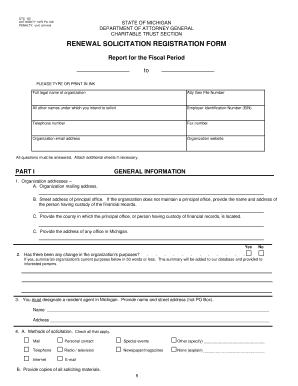Renewing your car registration is an essential task that ensures your vehicle remains legally operational on the roads. In Michigan, the process has become more accessible and convenient with online services provided by the Secretary of State. This guide aims to walk you through the steps required to renew your state of Michigan car registration online in 2023, ensuring a smooth and hassle-free experience.
With advancements in digital technology, many administrative tasks have transitioned to online platforms, including vehicle registration renewal. The State of Michigan offers an efficient system that allows residents to handle their vehicle's paperwork from the comfort of their homes. Understanding how this system works can save you time and effort, making it easier to keep your vehicle compliant with state regulations.
Understanding MI Bridges
MI Bridges is a crucial resource for those who may need assistance covering the costs associated with emergencies. While primarily focused on providing relief for emergency situations, it also highlights the importance of financial planning when it comes to regular expenses like vehicle registration. By applying for benefits through MI Bridges, individuals can better manage their finances, potentially freeing up funds needed for timely vehicle registration renewals.
This service allows users to apply for multiple programs simultaneously, streamlining the application process. For those facing financial hardships, having access to such resources can be invaluable in maintaining necessary services and legal obligations, such as keeping a vehicle properly registered.
Connecting with support systems like MI Bridges ensures that even during challenging times, individuals can stay compliant with legal requirements without undue stress or financial burden. It serves as a reminder of the interconnectedness of various aspects of personal finance management.
Legal Framework for Vehicle Registration Renewal
According to Michigan Compiled Laws (MCL) Section 257.227, the renewal of a vehicle registration must be initiated by the owner through a proper application accompanied by the payment of the applicable registration fee. This law underscores the necessity of both completing the correct documentation and fulfilling financial obligations to maintain legal status for driving.
The statute emphasizes the responsibility of vehicle owners to ensure their registrations are current, which helps uphold road safety standards across the state. By adhering to these regulations, drivers contribute to safer communities and avoid potential penalties for non-compliance.
Understanding the specific legal framework governing vehicle registration provides clarity on what actions are required to remain within the bounds of the law, fostering responsible ownership practices among Michigan residents.
Commercial Vehicle Registration Renewal Services
The Secretary of State in Michigan extends its online services to include commercial vehicles, offering businesses the convenience of renewing their fleet’s registration tags electronically. This initiative not only simplifies operations for organizations but also aligns with modern business needs for efficiency and speed.
By enabling online processing, the state facilitates smoother transactions for companies managing numerous vehicles, reducing paperwork and administrative overheads significantly. Such measures demonstrate the state's commitment to supporting commercial activities while maintaining regulatory compliance.
This expansion of digital services exemplifies how technological integration enhances governmental functions, benefiting both private citizens and corporate entities alike in their interactions with state authorities.
Handling Violations and Registration Plate Transfers
MCL Section 257.227a addresses scenarios involving vehicles implicated in violations, detailing procedures regarding the renewal, replacement, or transfer of registration plates. It mandates that either the owner or a designated representative must appear at a branch office for such transactions, emphasizing the seriousness of these matters.
This section reinforces the importance of addressing any legal issues promptly to prevent further complications or penalties. Ensuring all documentation is accurate and up-to-date becomes paramount when dealing with vehicular infractions or changes in ownership status.
By following prescribed protocols outlined in the legislation, individuals can navigate complex situations involving their vehicles more effectively, preserving their rights and responsibilities under the law.
Accessing E-Services Through the Michigan Secretary of State
The Michigan Department of State provides comprehensive e-services designed to enhance user accessibility and convenience. These services cover a wide range of functions, including vehicle registration renewals, facilitating seamless interactions between residents and government offices.
For optimal use of these features, users should ensure JavaScript is enabled on their browsers, as this functionality is integral to navigating the site successfully. The platform offers extensive resources, including FAQs and contact information, guiding visitors through various processes they might encounter.
Embracing these electronic services represents a forward-thinking approach to civic engagement, empowering citizens with tools necessary to manage personal and professional affairs efficiently within the digital age.
Obtaining Copies of Your Vehicle Registration
In Connecticut, obtaining a copy of your vehicle registration involves understanding that documents printed from the web, such as renewals or reprints, exclude address details to safeguard privacy. Similar principles likely apply in other states, including Michigan, where protecting personal information remains a priority.
Residents can acquire duplicates or copies of their registrations via several methods: online, by mail, or in-person at designated DMV locations. Each option caters to different preferences and circumstances, ensuring accessibility regardless of individual constraints.
This flexibility in service delivery reflects contemporary approaches to public administration, prioritizing customer satisfaction and security while maintaining compliance with relevant regulations.
Exploring Additional Fees Related to Electric Vehicles
A recent discussion highlighted unexpected fees associated with electric vehicle registrations in Michigan, revealing additional charges beyond standard renewal costs. Transportation electrification fees amounting to $75 and specific license renewal fees totaling $30 illustrate the growing complexity of vehicle-related expenditures.
Such findings underline the significance of staying informed about evolving fee structures linked to emerging technologies like electric vehicles. Awareness empowers consumers to budget accordingly and anticipate any supplementary costs involved in owning alternative fuel automobiles.
As states continue adapting policies to accommodate new automotive innovations, ongoing education regarding these developments will prove beneficial for both current and prospective EV owners navigating changing landscapes of vehicle ownership and maintenance.

